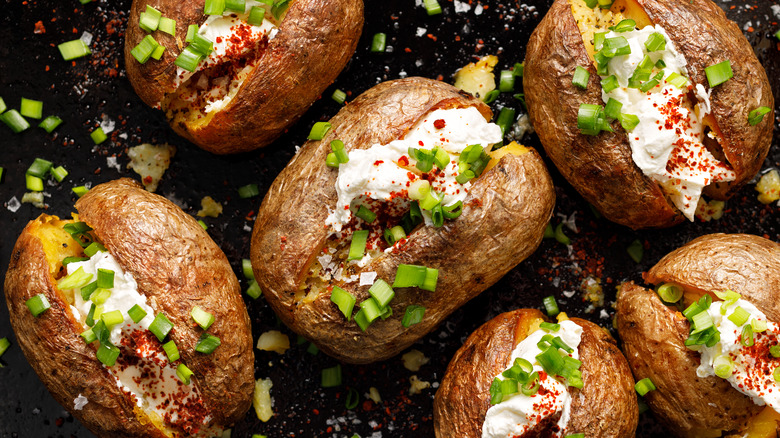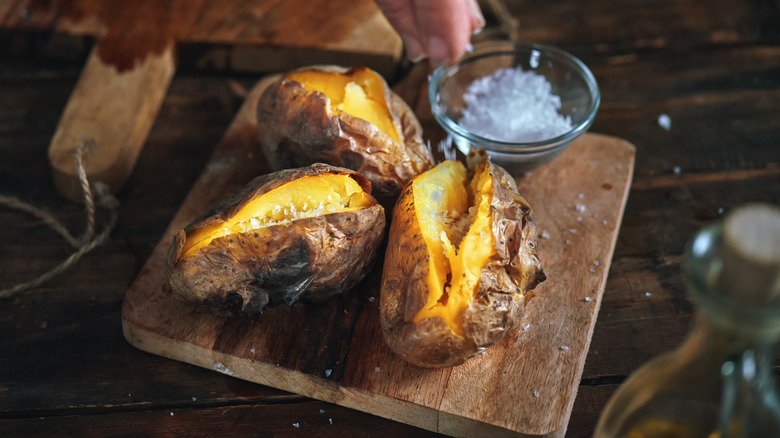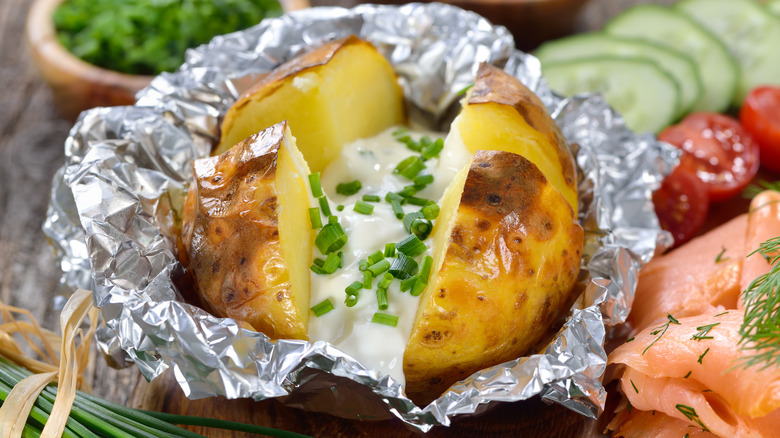Season Your Baked Potatoes At The Beginning And Taste The Difference
Arguably the best way to enjoy a handful of potatoes is to season and bake them; no fancy tricks or extra work in sight. There's truly no better comfort food than a steaming, cracked-open spud that's stuffed with cheese, chives, and seasoned meats, such as pork floss or chicken. It's like the edible version of an afternoon nap. But to achieve this tender tater, forget everything you've heard about the art of baking potatoes.
As the saying goes, there's a time for everything. This is especially true regarding oiling and seasoning your potatoes. If you oil and season at the end, they won't have time to absorb any additional flavors. You actually want to season your baked potatoes closer to the start of the whole process.
As soon as your potato has warmed up a bit in the oven, take it out, slather on your olive oil and preferred spices, then put the spud back in. This is actually the best time to alter your potatoes' profile, when they've just begun to bake. That way, they will come out with a perfect flavor and texture, ready for you to adorn with extra toppings and, finally, plate the dish.
The best seasonings to add to baked potatoes
If you're smoking a brisket for a late-night summer barbecue, save some extra seasoning for your potatoes. Freshly cracked black pepper mixed with savory powders, salt, and sugar is one of the best seasonings you can roll your potato in. And, when smoked over a bed of smoldering charcoal or wood chips, the spud can absorb a deep hickory profile incomparable to any baked potato you may have had prior.
Besides brisket dry rub, plenty of other powders pair well with your baked potatoes. Take Trader Joe's ketchup powder or pizza seasoning, for example. As unconventional as they are, these creative blends can infuse your potatoes with a unique tomatoey taste. The garlic notes of the pizza seasoning are especially noticeable when coupled with the potatoes' olive-oil-baked skin, which is packed with earthy flavors and nutritional benefits.
If you've always peeled the skins off of your potatoes or you've only eaten the gooey insides of a twice-baked, you may not be receiving all of the nutritional value you stand to gain. As noted by Potatoes USA, potato skins contain a notable amount of fiber. So, instead of ignoring the outer layer, season it to perfection and enjoy the whole thing. Your body will thank you for it.
One myth could foil your baked-potato plans
It's often said aluminum foil can improve your potato-dining experience. Want to cook a baked potato over less time or have it stay on the counter for a while? Wrap it in aluminum foil, the myth goes; this will supposedly prepare it faster and more thoroughly than without the metal layer. Unfortunately, this tactic can leave you with one mushy murphy.
Potatoes are about 80% water, so when you wrap them in aluminum foil, there will be nowhere for this water content to go. Say "goodbye" to the crispy skin you aimed to get; you might end up with only a damp potato, its oil and seasoning dripping right off. Additionally, you can't see the potato cooking when it's covered in shiny metal. So, this can cause it to slightly burn or give it an unpleasant taste and texture. Nobody wants charred seasoning on burnt potato skin.
If old habits refuse to die, it's okay. We get it. You can still enjoy your potato without its olive-oil-infused, crackling skin. In this case, it might be better to halve your potatoes and season them on the fleshy side. That way, the water inside the potato won't be solely contained within. Plus, the spices will adhere better to the inside of the potato than the outside, especially with butter involved. In that case, it's recommended to stick with classic flavorings, like pepper or salt, which can ultimately make the baked potato fluffier.


